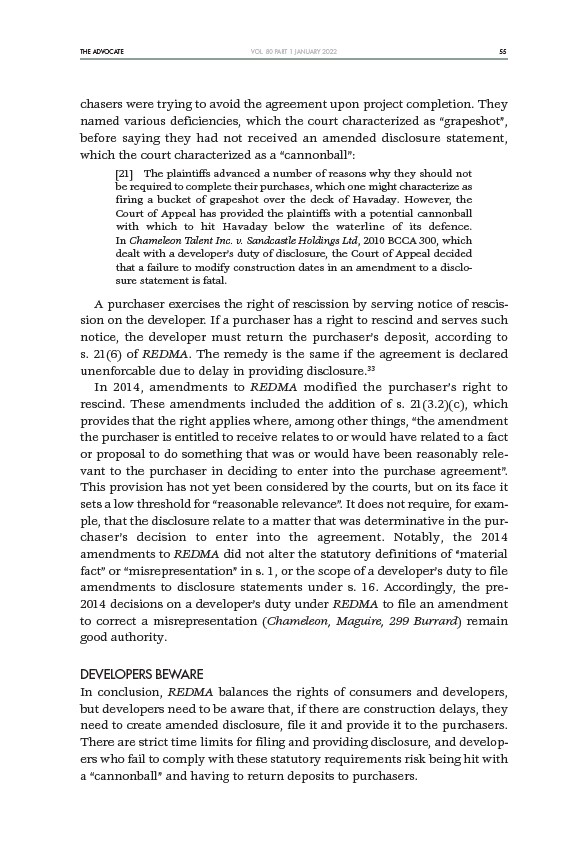
THE ADVOCATE 55
VOL. 80 PART 1 JANUARY 2022
chasers were trying to avoid the agreement upon project completion. They
named various deficiencies, which the court characterized as “grapeshot”,
before saying they had not received an amended disclosure statement,
which the court characterized as a “cannonball”:
21 The plaintiffs advanced a number of reasons why they should not
be required to complete their purchases, which one might characterize as
firing a bucket of grapeshot over the deck of Havaday. However, the
Court of Appeal has provided the plaintiffs with a potential cannonball
with which to hit Havaday below the waterline of its defence.
In Chameleon Talent Inc. v. Sandcastle Holdings Ltd, 2010 BCCA 300, which
dealt with a developer’s duty of disclosure, the Court of Appeal decided
that a failure to modify construction dates in an amendment to a disclosure
statement is fatal.
A purchaser exercises the right of rescission by serving notice of rescission
on the developer. If a purchaser has a right to rescind and serves such
notice, the developer must return the purchaser’s deposit, according to
s. 21(6) of REDMA. The remedy is the same if the agreement is declared
unenforcable due to delay in providing disclosure.33
In 2014, amendments to REDMA modified the purchaser’s right to
rescind. These amendments included the addition of s. 21(3.2)(c), which
provides that the right applies where, among other things, “the amendment
the purchaser is entitled to receive relates to or would have related to a fact
or proposal to do something that was or would have been reasonably relevant
to the purchaser in deciding to enter into the purchase agreement”.
This provision has not yet been considered by the courts, but on its face it
sets a low threshold for “reasonable relevance”. It does not require, for example,
that the disclosure relate to a matter that was determinative in the purchaser’s
decision to enter into the agreement. Notably, the 2014
amendments to REDMA did not alter the statutory definitions of “material
fact” or “misrepresentation” in s. 1, or the scope of a developer’s duty to file
amendments to disclosure statements under s. 16. Accordingly, the pre-
2014 decisions on a developer’s duty under REDMA to file an amendment
to correct a misrepresentation (Chameleon, Maguire, 299 Burrard) remain
good authority.
DEVELOPERS BEWARE
In conclusion, REDMA balances the rights of consumers and developers,
but developers need to be aware that, if there are construction delays, they
need to create amended disclosure, file it and provide it to the purchasers.
There are strict time limits for filing and providing disclosure, and developers
who fail to comply with these statutory requirements risk being hit with
a “cannonball” and having to return deposits to purchasers.